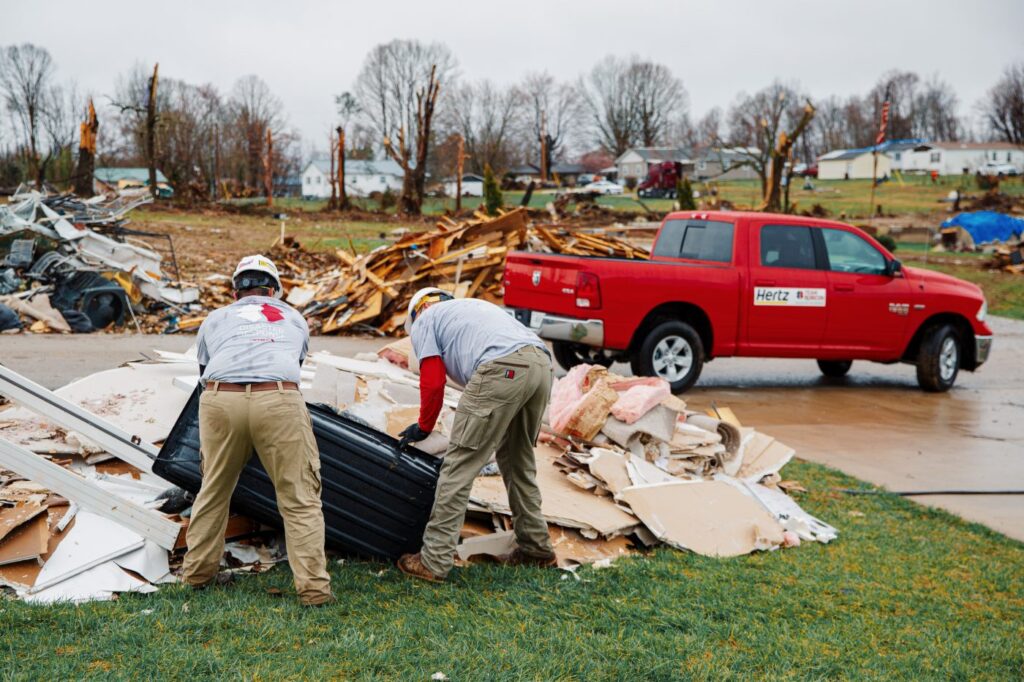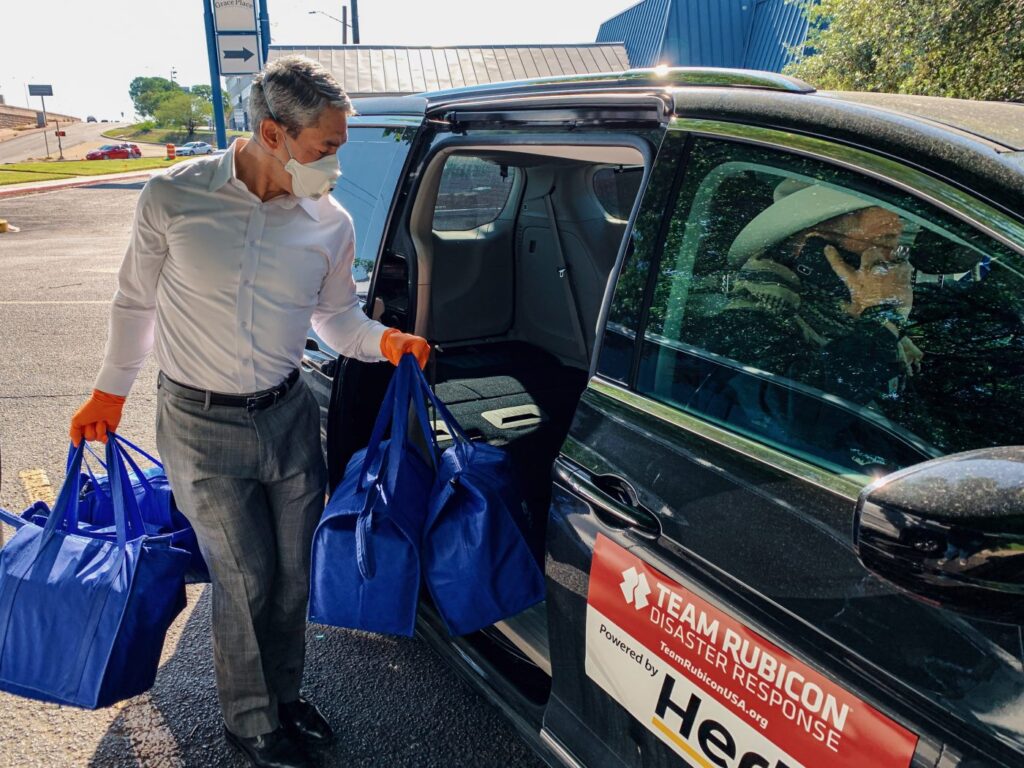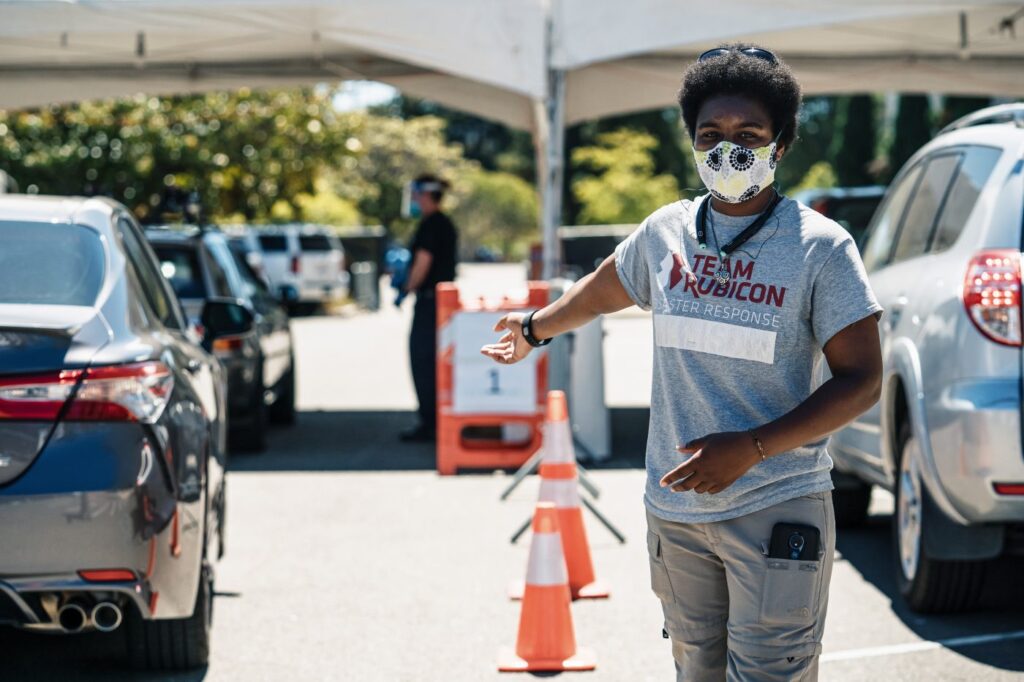It was the beginning of March, before the coronavirus had reached pandemic stage in the U.S., and already Mother Nature was gearing up for battle. On March 3, severe storms had swept through Tennessee, bringing with them multiple tornadoes, including in Putnam County an EF-4 with 175 mph wind speeds that, over its 8-mile course, damaged or destroyed dozens of homes and businesses, killed 19 people, and injuring 88 others.
Two days later, 55 Team Rubicon volunteers known as Greyshirts were en route to the area, bringing sawing and mucking skills with, to cut through downed branches and felled damage and remove debris strewn across roads and homes.
It was also an opportunity for Team Rubicon to lean on rental car company Hertz, who joined as an official partner in 2019. To lend further support, Hertz handed off the keys to 13 vehicles, all at no charge.
It wasn’t just the cost savings that made a difference, according to Sean Peavey, a mentor for the logistics section chiefs on the operation. When Team Rubicon first arrived, there weren’t enough pickup trucks available in the area of a disaster. Hertz was able to source exactly what the team needed—a set number of pickup trucks, passenger vehicles, and SUVs—which their team at the Nashville International Airport location brought in from elsewhere, staged, and had ready for the Greyshirts.

Greyshirts responding to Louisiana tornadoes in April 2020.
That initial response to the tornadoes in Tennessee was just the first phase in Hertz’s in-kind vehicle support and a partnership that would soon play out again and again across the country. Team Rubicon would spin up COVID-19 responses and new feeding operations, and Hertz—with its extensive network of U.S. locations and large fleet of vehicles—would step in to get Team Rubicon Greyshirts on the ground and into action, quickly.
“We’re happy to support Team Rubicon by providing them with much-needed resources to help power their recovery efforts in Nashville, and their extensive efforts across the nation in response to COVID-19,” said Matt Turner, Hertz Director of Corporate Responsibility. “This is a challenging time and we’re glad our vehicles could be used to serve the community.”
Tornadoes Spawned, then Feeding Operations Launched
Before its response to the Putnam County tornado was over, COVID-19 had swept the country and Team Rubicon was expanding its traditional disaster relief work to include serving communities battling COVID-19, as in New Mexico, where Greyshirts were helping with a feeding operation. Meals on Wheels Albuquerque’s volunteer base had been diminished during the coronavirus pandemic as many volunteers suddenly found themselves in the high-risk category. Now, instead of driving meals to their neighbors in need, they too were being asked to stay home and shelter-in-place.
So, Team Rubicon Greyshirts stepped in to fill the void. Yet Team Rubicon wanted to ensure seamless deliveries to many of Albuquerque’s 500 Meals on Wheels clients without requiring the volunteers to drive their own personal cars. In stepped Hertz with a solution: Take five vehicles for the length of the month-long operation, at no charge.

Greyshirts prepare to deliver emergency meals during the coronavirus pandemic.
Still, there was the coronavirus to consider. To stay in accordance with COVID-19 protocols, Meals on Wheels requested that only people living in the same household ride together, and that applied to only one of the Greyshirt teams. And so, Hertz double-downed on its offer: Instead of providing five cars for Greyshirts to use for one month, it would provide nine. And when the operation stretched to two months, the car loans extended as well.
In all, over the course of two months, Greyshirts drove nearly 3,000 miles and delivered 4,056 meals for Meals on Wheels of Albuquerque.
Cars Against COVID-19
Meanwhile, across the nation, the Navajo Nation was experiencing staggering rates of COVID-19. To assist doctors and nurses on the ground, Team Rubicon began deploying 20 Greyshirts—nurses, EMTs, and doctors included—on April 10 to Kayenta, Arizona. They would serve alongside local medical staff to help people with coronavirus symptoms and other medical concerns.
The rental vehicle program for the Kayenta operation was a bit unique: Not only were the cars being used to transport volunteer doctors, nurses, and paramedics from airports in Phoenix and Albuquerque to the remote area, they were also being used to transport volunteers to different medical sites across the Navajo Nation.
“There’s significant drive time between locations; most of our facilities have about an hour’s drive between them. We use the Hertz vehicles to travel to and from locations, EMTs and nurses can work their shifts. We use the cars too for logistical support, like making sure our medical volunteers have food and supplies. And, of course, we use the vehicles for our command staff to get around to meetings, which are also spread out throughout the reservation,” explained Mike West, a Team Rubicon incident commander in Kayenta. “Geography is probably the biggest challenge for us, and the ability to use the Hertz vehicles has helped us alleviate many of the issues associated with that.”
On June 7, Team Rubicon announced that, in coordination with Indian Health Services, its EMS support would continue in Kayenta and at the Inscription House Health Clinic 45 miles away. It would also expand to Chinle, 70 miles southeast of Kayenta, and to Shiprock, New Mexico. In addition to medical and incident command assistance, Team Rubicon would also provide safety officers—who assist with everything from ensuring proper PPE use to directing hospital traffic—to the Gallup Indian Medical Hospital in New Mexico. In the end, 128 Greyshirts spent more than 90 days at the Navajo Nation and saw nearly 3,000 patients.
Making COVID-19 Testing Operations Possible
Over the course of two months, both Team Rubicon’s medical operation at the Navajo Nation, and the fleet of vehicles it uses in that, have grown. It’s not the organization’s only medical-related operation using Hertz vehicles, however.
In May, Team Rubicon partnered with Verily, to stand up COVID-19 testing sites across the state of California. There, Team Rubicon began using Hertz vehicles to transport Greyshirts volunteering to the testing sites, run logistical support, and help stand up new coronavirus testing sites rapidly.

Directing traffice at a COVID-19 testing site in Oakland, CA.
In fact, Hertz’s support has had a serious impact on Team Rubicon’s bottom line over the past six months. In a typical year, Team Rubicon spends millions on vehicle rentals in order to provide its free services to vulnerable populations across the country. By mid-July, the disaster relief organization had already put 87 Hertz vehicles to use in 59 operations that ranged from tornado responses to coronavirus-related medical missions. In all, the partnership with Hertz has saved Team Rubicon more than $140,000 in the first half of 2020 alone.
“It is saving Team Rubicon money on vehicle rentals that we can apply in other operational areas,” explains Team Rubicon’s Deputy Director of Operations Support William Porter. “One of the most prescient examples is the Verily testing sites. Because we’re not burning capital on rental vehicle costs, we have the fluidity to scale very quickly. We don’t need to line outstanding budgets for Team Rubicon, or between Team Rubicon and Verily. It allows us to just move forward and actually get supplies and services to people in need.”



